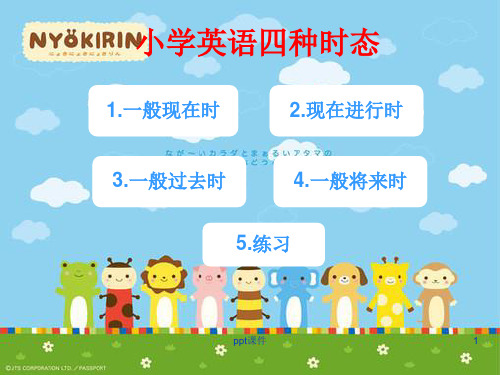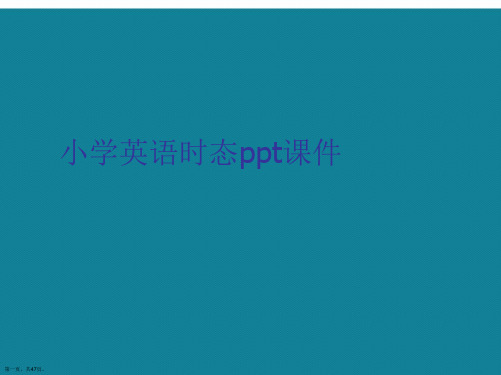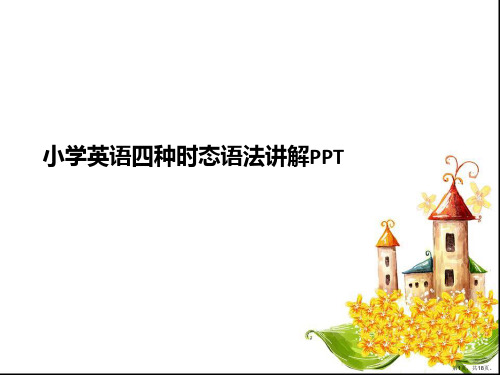最新小学英语时态.ppt
合集下载
小学英语四种时态 ppt课件

ppt课件 4
3. 一般疑问句 (1)Am / Is / Are+主语+表语+? Is your mother a nurse? 你妈妈是护士吗? Is Polly a bird? 波利是鸟吗? (2)Do+主语+动词原形+其它+? Do you like learning English? 你喜欢学习英语吗? Does your father go to work every day? ppt课件 你爸爸每天都上班吗?
5
4. 特殊疑问句
特殊疑问词+一般疑问句+? What is your father? 你爸爸是干什么的? What do you do every day? 你每天做些什么? When does your mother go to work every day? 你妈妈每天什么时候去上班?
ppt课件 6
13
1.The twins are ___________(wash) the washing clothes now. 2.Look! He is ________ playing(play) basketball over there. 3.Listen! ______ Sally _______(sing)? singing Is 4.What _____(be) you doing (do) are now.
注意,以下情况要使用一般现在时:
• 表示特征、性格和能力。如: Lifeng is a tall boy. 李锋是一个高个子男孩。 That's a big tree. 那是一棵大树。 My skirt is very new. 我的裙子很新。 She can speak English. 她会说英语。 2. 表示经常发生的或习惯性的动作。如: I get up at seven every day. 我每天7点起床。 Classes begin are seven days in a week. 一周有七天。 The earth goes around the ppt sun. 课件 地球绕着太阳转。
3. 一般疑问句 (1)Am / Is / Are+主语+表语+? Is your mother a nurse? 你妈妈是护士吗? Is Polly a bird? 波利是鸟吗? (2)Do+主语+动词原形+其它+? Do you like learning English? 你喜欢学习英语吗? Does your father go to work every day? ppt课件 你爸爸每天都上班吗?
5
4. 特殊疑问句
特殊疑问词+一般疑问句+? What is your father? 你爸爸是干什么的? What do you do every day? 你每天做些什么? When does your mother go to work every day? 你妈妈每天什么时候去上班?
ppt课件 6
13
1.The twins are ___________(wash) the washing clothes now. 2.Look! He is ________ playing(play) basketball over there. 3.Listen! ______ Sally _______(sing)? singing Is 4.What _____(be) you doing (do) are now.
注意,以下情况要使用一般现在时:
• 表示特征、性格和能力。如: Lifeng is a tall boy. 李锋是一个高个子男孩。 That's a big tree. 那是一棵大树。 My skirt is very new. 我的裙子很新。 She can speak English. 她会说英语。 2. 表示经常发生的或习惯性的动作。如: I get up at seven every day. 我每天7点起床。 Classes begin are seven days in a week. 一周有七天。 The earth goes around the ppt sun. 课件 地球绕着太阳转。
小学英语语法——时态(共17张PPT)

17
stop→stopped
plan→planned
动词过去式规则变化
10
表示过去发生的而现在已经结束的事情、动作或情况,
常和明确的过去时间状语连用,如:yesterday,
last week, three days ago等。
基 本
My brother got married last week.
用
本
用
用现在进行时表示将来,常用这种结构的动词有go,
法
come, leave, stay等位移性动词,表示即将发生或
安排好要做的事情。
We are leaving for Shanghai.
The bus is coming soon.
8
一般过去时
be动词型:句子的谓语动词只有be动词(was或were)。
C. got up
2. What did you see ________?
A. now
B. every day
C. just now
3. He went into the room and________ the door.
A. lock
B. locking
C. locks
4. ---What________ you ________ last week?
构
成
Are they swimming in the bedroom?
特殊疑问句:特殊疑问词+am/is/are+主语+动词的现在分词
+其它成分
Where are they swimming?
6
1. 一般情况下,直接在动词词尾加-ing。
英语时态ppt课件小学

Usage
The past continuous tense is used to describe an action that was happening at a specific time in the past It is commonly used in stories or when describing a sequence of events that occurred in the past
Usage
The past perfect continuous tense is used to show that an action had been happening at a specific time in the past and was interrupted by another action It is commonly used in stories or when describing a sequence of events that occurred in the past
Present continuous tense
Definition
The present continuous tense is used to describe an action that is currently happening It is formed using the verb "to be" and the present particle (- ing) of the verb
This tense is often used to express plans or arrangements for the future, such as "I will be meeting my friends tomorrow" or "They will be flying to New York next week."
The past continuous tense is used to describe an action that was happening at a specific time in the past It is commonly used in stories or when describing a sequence of events that occurred in the past
Usage
The past perfect continuous tense is used to show that an action had been happening at a specific time in the past and was interrupted by another action It is commonly used in stories or when describing a sequence of events that occurred in the past
Present continuous tense
Definition
The present continuous tense is used to describe an action that is currently happening It is formed using the verb "to be" and the present particle (- ing) of the verb
This tense is often used to express plans or arrangements for the future, such as "I will be meeting my friends tomorrow" or "They will be flying to New York next week."
新标准版小学英语一般现在时态精品PPT课件

44
结束语
当你尽了自己的最大努力时,失败也是伟大的, 所以不要放弃,坚持就是正确的。
When You Do Your Best, Failure Is Great, So Don'T Give Up, Stick To The End 演讲人:XXXXXX 时 间:XX年XX月XX日
一般现在时
一般现在时表示或习 惯性的动作,也可表示现 在的状态或主语具备的 性格和等。
一般现在时
(肯定句)
在一般现在时中,句 中有be动词或情态动词 (can等)时,be动词要 随主语而相应改变,情态 动词不变。 例如
一般现在时 (肯定句)
1、I am a teacher. 2、He is a student. 3、You are a boy. 4、I can swim.
特殊疑问句
没有be动词或情态动 词构成:疑问词+do (does)+主语+动词 原形+其它 例如
特殊疑问句(时间)
单数第三人称: He goes to school at seven.
W 非单he数n 第d三oe人s 称he:go to school?
I go to school at six. When do you go to school?
一般现在时 (疑问句)
句中没有be动词或情态动词时,
主语为非第三人称单数,一般疑问句
在句首加do,句子中动词用原形。主
语为第三人称单数,一般疑问句在句
首加does,句子中原有动词用原形;
Some变any.
例如
一般现在时 (一般疑问句)
1、I go to school by bus. 疑问句: Do you go to school by bus. 2、He goes to school by bus. 疑问句: Does he go to school by bus.
结束语
当你尽了自己的最大努力时,失败也是伟大的, 所以不要放弃,坚持就是正确的。
When You Do Your Best, Failure Is Great, So Don'T Give Up, Stick To The End 演讲人:XXXXXX 时 间:XX年XX月XX日
一般现在时
一般现在时表示或习 惯性的动作,也可表示现 在的状态或主语具备的 性格和等。
一般现在时
(肯定句)
在一般现在时中,句 中有be动词或情态动词 (can等)时,be动词要 随主语而相应改变,情态 动词不变。 例如
一般现在时 (肯定句)
1、I am a teacher. 2、He is a student. 3、You are a boy. 4、I can swim.
特殊疑问句
没有be动词或情态动 词构成:疑问词+do (does)+主语+动词 原形+其它 例如
特殊疑问句(时间)
单数第三人称: He goes to school at seven.
W 非单he数n 第d三oe人s 称he:go to school?
I go to school at six. When do you go to school?
一般现在时 (疑问句)
句中没有be动词或情态动词时,
主语为非第三人称单数,一般疑问句
在句首加do,句子中动词用原形。主
语为第三人称单数,一般疑问句在句
首加does,句子中原有动词用原形;
Some变any.
例如
一般现在时 (一般疑问句)
1、I go to school by bus. 疑问句: Do you go to school by bus. 2、He goes to school by bus. 疑问句: Does he go to school by bus.
演示文稿小学英语时态

4. She lives in a small town near New York. (改为一般疑问句)
5. I watch TV every day. (改为一般疑问句) 6. David has got a goal. (改为一般疑问句)
第十六页,共47页。
连词成句
1.the, cleaning, Ann, are, I, classroom, and
swim____ close_____ drive_____ watch___ put——
第二十页,共47页。
现在进行时
1.Mr Zheng
(read) a book now.
2. The rabbits
(jump) now.
3.. Look ! Tom and John
(swim).
4. My brother room now.
第二十四页,共47页。
现在进行时
2. They are singing in the classroom.
否定句:____________________________
一般疑问句:_________________________ 肯定回答:__________________________ 否定回答:__________________________
4) 以f或fe结尾,把f或fe,改为v+es. 5) 特殊:is-are have-has, …
第五页,共47页。
一般现在时
1.go--
2.get---
4.put--- 5.have---
7.take--- 8.do---
10.know--- 11.buy--
e--6.see --9.read--12.say---
5. I watch TV every day. (改为一般疑问句) 6. David has got a goal. (改为一般疑问句)
第十六页,共47页。
连词成句
1.the, cleaning, Ann, are, I, classroom, and
swim____ close_____ drive_____ watch___ put——
第二十页,共47页。
现在进行时
1.Mr Zheng
(read) a book now.
2. The rabbits
(jump) now.
3.. Look ! Tom and John
(swim).
4. My brother room now.
第二十四页,共47页。
现在进行时
2. They are singing in the classroom.
否定句:____________________________
一般疑问句:_________________________ 肯定回答:__________________________ 否定回答:__________________________
4) 以f或fe结尾,把f或fe,改为v+es. 5) 特殊:is-are have-has, …
第五页,共47页。
一般现在时
1.go--
2.get---
4.put--- 5.have---
7.take--- 8.do---
10.know--- 11.buy--
e--6.see --9.read--12.say---
小学英语四种时态语法讲解PPT

like→liked dance→danced live→lived
以辅元辅结尾的重读闭音节,双 plan→planned
写尾字母,再加-ed
stop→stopped
drop→dropped
结尾是“辅音字母+y”的动词, study→studied
改“y”为“i”再加-ed
worry→worried
已有e,则只加-s。
wash→washes
do→does
以辅音字母加y结尾的词
study→studies
carry→carries
fly→flies
第12页,共18页。
三、现在进行时
第13页,共18页。
现在进行时
1、概念:现在(说话的瞬间)正在进行或发生的动 作,强调“此时此刻”。
2、标志词: look 看 ;listen听 ;now现在;
等;
3)由“时间段+ago”构成的短语:long long ago,a moment ago, a short
time ago,three days ago等;
4)其它:just now等
第5页,共18页。
3、基本结构:
• ①be动词(注意be的人称变化,单数用was,复数 用were)
I was in the classroom yesterday morning. He was in the classroom yesterday morning. They were in the classroom yesterday morning.
第11页,共18页。
动词第三人称变化规则: 规则
例子
一般在词尾加-s
Play→plays leave→leaves swim→swims
小学英语时态课件
一般将来时否定句: 在be动词后面加not或情态动词will后加not won't
一般将来时般疑问句: be或will提到句首,some改为any;and改为or 第一、二人称互换。
5、Nancy is going to go camping. (改为否定)
Nancy _______going to go camping. 6、I'm go to get up at 6:30 tomorrow. (改为一般疑问句)
5.小学阶段不规则动词一般过去时
am/is→was
are→were
do→did
sing→sang
give→gave
run→ran
eat→ate
take→took
ride→ rode
drive→drove
get→got
go→went
know→knew
see→saw
buy→bought
have/has→had sit→sat come→came write→wrote speak→spoke make→made teach→taught
and I are______(make) a model plane. 12. Look, he is______(clean) the windows. 13. The boys______(run) with the cat now. 14. I can’t______(skate), but I can______(ski). 15. The students are______(draw) in the classroom. 16. My sister and I like______(listen) to music. 17. My father_______(watch) TV in the bedroom now. 18. There______(be) a lamp near the sofa. 19. What______he_____(do) now? He_______(swim) . 20. I like_____(jog). I can______(jog). I am_____ (jog) in the street now.
小学英语时态-PPT
一般现在时
(2) 当句子中即没有be动词,也没有情态动词时 ①陈述句:We get up at 7:00 every morning. 疑问句→Do you get up at 7:00 every morning? 否定句→We don’t get up at 7:00 every morning. ②陈述句:She has a little brother. 疑问句→ Does she have a little brother? 否定句→ She doesn’t have a little brother.
现在进行时
1. The boy is playing basketball. 否定句:____________________________ 一般疑问句:_________________________ 肯定回答:__________________________ 否定回答:__________________________
12. We _________ (not watch) TV on Monday.
13. Nick_______ (not go) to the zoo on Sunday.
14. They _________ (like) the World Cup?
按要求完成句子
1.Do you often play football after school? (肯 定回答) 2. I have many books. (改为否定句) 3. Gao Shan’s sister likes playing table tennis (改为否定句) 4. She lives in a small town near New York. (改为一般疑问句) 5. I watch TV every day. (改为一般疑问句) 6. David has got a goal. (改为一般疑问句)
小学英语时态和语法总结精品PPT课件 图文
特殊疑问句练习
They bought a new bike yesterday. She is my teacher. I am looking for my sister I get up at six I went to school late because I got
up late.
适的位置 如:when do you get up every morning? (6:
30) 确认提问的是时间 改为陈述句 I get up every morning. 时间at 6:30放在句子的合适位置。 I get up at 6:30 every morning.
Two cups.
A. How many B. How much C. How soon D. Which
( ) 8. ______ shall we meet in the park?
What about half past eight?
A. What B. When C. Where D., Which
改一般疑问句练习
1. It is a lovely dog. 2. She is a lovely girl. 3. He is his father. 4. They are Lily’s cousins. 5. We are classmates. 6. I am a doctor.
如何将陈述句改为一般疑问句
一、看句子里是否有be动词, am , is, are, 如果 有be动词提前,句号改问号。但是要注意,如果主 语是I,或we, 变成一般疑问句时,要改为you.
二、看句子里是否有情态动词:can , may , must, 如果有,把情态动词提前,句号改问号。但是要注 意,如果主语是I,或we, 变成一般疑问句时,要改为 you.
小学英语动词时态ppt课件
• Mom is sleeping at the moment. • The scientist is doing an experiment this week. • Jack is coming soon. (按计划将要发生的动作) • It is getting dark. (表示事物发生变化的过程)
一般将来时 • 将要发生的动作或事先计划好将要发生的动作。 • next week , tonight , in five minutes
• I / We + shall + 动词原形 + …… • 各人称单/复数 + will + 动词原形 + …… • be going to + 动词原形 + …… • Shall I / We + 动词原形 +…… (征求某人意见时) • 例句:Shall I open the window?
•
I have not finished my homework.
常用助动词:be , do , have , shall(should) , will(would)
• 4. 谓语为“情态动词+实意动词”时:
•
情态动词 + not + 动词原形
• 例句:
•
We can not go swimming this weekend.
三单
does not + 动词原形 He doesn't like ... She doesn't like ... It doesn't like ...
过去时 did not + 动词原形
• 3.谓语为“助动词+实意动词”时:
- 1、下载文档前请自行甄别文档内容的完整性,平台不提供额外的编辑、内容补充、找答案等附加服务。
- 2、"仅部分预览"的文档,不可在线预览部分如存在完整性等问题,可反馈申请退款(可完整预览的文档不适用该条件!)。
- 3、如文档侵犯您的权益,请联系客服反馈,我们会尽快为您处理(人工客服工作时间:9:00-18:30)。
evening.
7. Wang Kai and Wang Li__h__a_v__e (have)lunch
every day.
8.We often__p__l_a_y_ (play) in the playground. 9. Chen Jie sometimes __g_o__e_s___(go) to the
小学英语时态.ppt
一般现在时
一般现在时:表示经常性的事情,习惯 性的动作或一般性事实。 时间状语: often 经常, usually通常, always 总是,every day每天, sometimes 有时等。
句子结构:1.主语+is/am/are(be 动词)+其他 2.主语(非单三)+动词原形+其他 3.主语(单三)+动词s或es+其他
wash--washes,go--goes 3) 辅音字母加y结尾,把y改为i ,+es, 如:
fly--flies, worry--worries, carry--carries 4) 特殊: have-has
一般现在时
1.go--goes
2.get---
gets
comes
e---
4.put--- puts 5.have--h- as 6.see ---sees
非单三:I, you, we, they, 复数。 单三:he, she, it, 单个人(如my father ,your
sisiter),单个物(the cat, the dog)。
一般现在时
动词变单三: 1) 直接加s, 如: come-comes 2) 以o, x, s, sh, ch 结尾+es , 如: do--does,
work, ( )2.
Wwhoork_B_._Bw__o_rk_s_,
work C. work, English best in
works your class?
speak B. speaks C. speaking
( )3. He often ____C______ the windows .
the morning. A.get B. gets C. gets
( )6. Mary usually___C____to me .
A. will write B. write C. writes
( )7. He doesn't ___B____ cats.
A. likes B. like C. liking
一般现在时
①陈述句:She is a student. 疑问句→ Is she a student? 否定句→ She is not a student.
②陈述句:I can swim. 疑问句→ Can you swim 否定句→ I can not swim.
一般现在时
(2) 当句子中即没有be动词和can 时 ①陈述句:We get up at 7:00 every morning.
疑问句→Do you get up at 7:00 every morning? 肯定回答:Yes,we do. 否定回答:No,we don't. 否定句→We don’t get up at 7:00 every morning. ②陈述句:She has a little brother. 疑问句→ Does she have a little brother? 肯定回答:Yes, she does. 否定回答:No, she doesn't. 否定句→ She doesn’t have a little brother.
7.take--t-akes 8.do--- does 9.read--- reads
10.know-k--nows 11.buy--buys 12.say-s-a- ys
一般现在时
(1)句中有be动词或can时, 变疑问句: 把be和can提前,
开头大写,句末加问号。 变否定句:在be 和can 后加 not
一般现在时
1. She is a girl. 否定句: She isn't a girl. 一般疑问句: Is she a girl? 肯定回答: Yes, she is. 否定回答:No, she isn't.
一般现在时
2. He often goes to school at seven . 否定句: He doesn't often go to school at seven . 一般疑问句:
Does he often go to school at seven?
肯定回答:Yes,he does.
否定回答:No,he doesn't.
选择题
( )1..Tom is a worker. He __B___ in a factory. His
sisters ______ in a hospital.
( )8. My sister___C___often clean the room.
A. didn’t B. isn’t C. doesn’t
填空
1.I ____a_m_______ from China. (be) 2.Jack and Tom ___a_r_e____ my friends. (be) 3.Your parents _r_e_a__d_(read) books every day.
4.Li Lei always _c_o_m__e_s to school at 7:30.(come)
5.You always __d_o___ (do) your homework well.
6. The child often w__a_t_c_h__e_s(watch) TV in the
Байду номын сангаас
A. is cleaning B. clean C. cleans
( )4. We ___A_____ music and often __________ to
music.
like, listen B. likes, listens C. like, are listening
( )5. She sometimes ___C____ up at six in
7. Wang Kai and Wang Li__h__a_v__e (have)lunch
every day.
8.We often__p__l_a_y_ (play) in the playground. 9. Chen Jie sometimes __g_o__e_s___(go) to the
小学英语时态.ppt
一般现在时
一般现在时:表示经常性的事情,习惯 性的动作或一般性事实。 时间状语: often 经常, usually通常, always 总是,every day每天, sometimes 有时等。
句子结构:1.主语+is/am/are(be 动词)+其他 2.主语(非单三)+动词原形+其他 3.主语(单三)+动词s或es+其他
wash--washes,go--goes 3) 辅音字母加y结尾,把y改为i ,+es, 如:
fly--flies, worry--worries, carry--carries 4) 特殊: have-has
一般现在时
1.go--goes
2.get---
gets
comes
e---
4.put--- puts 5.have--h- as 6.see ---sees
非单三:I, you, we, they, 复数。 单三:he, she, it, 单个人(如my father ,your
sisiter),单个物(the cat, the dog)。
一般现在时
动词变单三: 1) 直接加s, 如: come-comes 2) 以o, x, s, sh, ch 结尾+es , 如: do--does,
work, ( )2.
Wwhoork_B_._Bw__o_rk_s_,
work C. work, English best in
works your class?
speak B. speaks C. speaking
( )3. He often ____C______ the windows .
the morning. A.get B. gets C. gets
( )6. Mary usually___C____to me .
A. will write B. write C. writes
( )7. He doesn't ___B____ cats.
A. likes B. like C. liking
一般现在时
①陈述句:She is a student. 疑问句→ Is she a student? 否定句→ She is not a student.
②陈述句:I can swim. 疑问句→ Can you swim 否定句→ I can not swim.
一般现在时
(2) 当句子中即没有be动词和can 时 ①陈述句:We get up at 7:00 every morning.
疑问句→Do you get up at 7:00 every morning? 肯定回答:Yes,we do. 否定回答:No,we don't. 否定句→We don’t get up at 7:00 every morning. ②陈述句:She has a little brother. 疑问句→ Does she have a little brother? 肯定回答:Yes, she does. 否定回答:No, she doesn't. 否定句→ She doesn’t have a little brother.
7.take--t-akes 8.do--- does 9.read--- reads
10.know-k--nows 11.buy--buys 12.say-s-a- ys
一般现在时
(1)句中有be动词或can时, 变疑问句: 把be和can提前,
开头大写,句末加问号。 变否定句:在be 和can 后加 not
一般现在时
1. She is a girl. 否定句: She isn't a girl. 一般疑问句: Is she a girl? 肯定回答: Yes, she is. 否定回答:No, she isn't.
一般现在时
2. He often goes to school at seven . 否定句: He doesn't often go to school at seven . 一般疑问句:
Does he often go to school at seven?
肯定回答:Yes,he does.
否定回答:No,he doesn't.
选择题
( )1..Tom is a worker. He __B___ in a factory. His
sisters ______ in a hospital.
( )8. My sister___C___often clean the room.
A. didn’t B. isn’t C. doesn’t
填空
1.I ____a_m_______ from China. (be) 2.Jack and Tom ___a_r_e____ my friends. (be) 3.Your parents _r_e_a__d_(read) books every day.
4.Li Lei always _c_o_m__e_s to school at 7:30.(come)
5.You always __d_o___ (do) your homework well.
6. The child often w__a_t_c_h__e_s(watch) TV in the
Байду номын сангаас
A. is cleaning B. clean C. cleans
( )4. We ___A_____ music and often __________ to
music.
like, listen B. likes, listens C. like, are listening
( )5. She sometimes ___C____ up at six in
